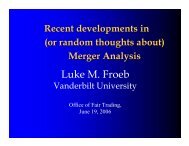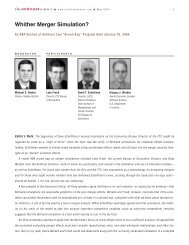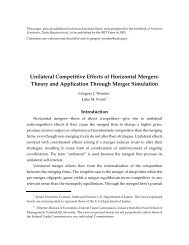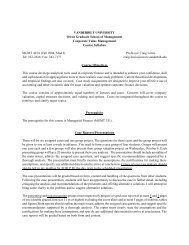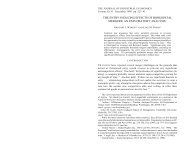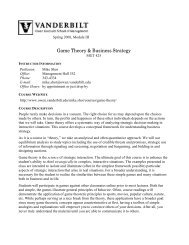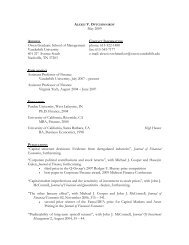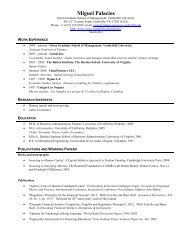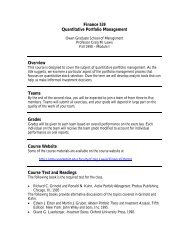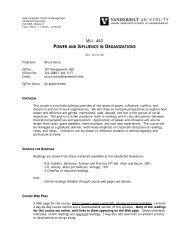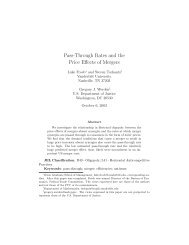syllabus - The Owen Graduate School of Management - Vanderbilt ...
syllabus - The Owen Graduate School of Management - Vanderbilt ...
syllabus - The Owen Graduate School of Management - Vanderbilt ...
Create successful ePaper yourself
Turn your PDF publications into a flip-book with our unique Google optimized e-Paper software.
HUMANITIES 161<br />
Mass Mediated Politics:<br />
Images and Issues<br />
Fall 2008, <strong>Vanderbilt</strong> University<br />
Wednesdays, 3:10–6:00 pm<br />
Wilson Hall 126<br />
PROFESSORS (bios at bottom <strong>of</strong> <strong>syllabus</strong>)<br />
Bruce Barry<br />
John M. Sloop<br />
Pr<strong>of</strong>essor <strong>of</strong> <strong>Management</strong> and Sociology<br />
Pr<strong>of</strong>essor <strong>of</strong> Communication Studies<br />
Office: 307 <strong>Management</strong> Hall (OGSM)<br />
Office: 311 Kirkland Hall<br />
Phone: 615-322-3489 Phone: 615-343-3141<br />
Email: bruce.barry@vanderbilt.edu<br />
Email: john.m.sloop@vanderbilt.edu<br />
TA: Adam Wilsman, Dept. <strong>of</strong> History<br />
Office: Buttrick 4-32 | Phone: 716-725-5974 | Email: adam.r.wilsman@vanderbilt.edu<br />
OVERVIEW<br />
Humanities 161 is an interdisciplinary, team-taught course in the College <strong>of</strong> Arts and Science that is<br />
built around changing contemporary topics each time it is <strong>of</strong>fered. In Fall 2008, the course will focus<br />
on political and social discourse during and surrounding the (ongoing) election cycle and presidential<br />
campaign. <strong>The</strong> class is intended as a vehicle for careful thought about the ways in which political<br />
issues become salient and important through mass mediated news and information channels, the<br />
ways those issues are represented, and the variety <strong>of</strong> ways in which citizens receive and interpret the<br />
news. In the process <strong>of</strong> examining these aspects <strong>of</strong> media and communication, we will take up a<br />
variety <strong>of</strong> contemporary political issues—foreign policy, economics, social issues, and so forth—as<br />
they are raised in the campaign discourse <strong>of</strong> 2008.<br />
<strong>The</strong> course is structured around recurrent themes that mark the landscape <strong>of</strong> contemporary political<br />
discourse, including such topics as media bias, campaign advertising, polling, debates, technology,<br />
among others. Readings and assignment deliverables will aim rhetorical, political, and sociological<br />
lenses at these and other elements <strong>of</strong> the campaign and election landscape. <strong>The</strong>re will be a number<br />
<strong>of</strong> guest speakers—academics who study these processes as well as pr<strong>of</strong>essionals who live them.<br />
<strong>The</strong> course will be significantly driven by the events that occur during the semester as the 2008<br />
general election approaches. <strong>The</strong>se events will prompt questions like these:<br />
• What political issues become important in campaign discourse?<br />
• What world and national events force issues to become important?<br />
• How are these events and issues represented in media and candidate discourse?<br />
• What do these representations say about the health <strong>of</strong> democratic processes?<br />
In short, we are interested in politics in the mass mediated age: how do issues become “important,”<br />
how are issues (and groups <strong>of</strong> people) represented once they become important, and how can we, as<br />
citizens, shape those discussions?
-2-<br />
READINGS/WEBSITE<br />
<strong>The</strong>re are two texts for the course, available at the <strong>Vanderbilt</strong> Bookstore:<br />
• S. Iyengar and J. McGrady, Media Politics: A Citizen's Guide. New York: W.W.Norton, 2007.<br />
• R. J. Semiatin (Ed.), Compaigns on the Cutting Edge. Washington: CQ Press, 2008.<br />
A website for the course, http://www2.owen.vanderbilt.edu/bruce.barry/hum161/, contains a dayby-day<br />
course outline and a downloadable version <strong>of</strong> this <strong>syllabus</strong>. Many readings for this course are<br />
online, with links to them appearing on the website. Two things to to know about online readings:<br />
[1] Many online readings are accessed through online services to which <strong>Vanderbilt</strong> subscribes<br />
for use by the university community. When accessing these articles, you may be asked to<br />
authenticate your status as a <strong>Vanderbilt</strong> user (with VUNet ID and password).<br />
[2] Adobe Reader is needed for some readings; the HUM 161 website has a download link.<br />
We may add new links to relevant articles or materials as we go; we’ll alert you when that occurs.<br />
In the event <strong>of</strong> differences between this <strong>syllabus</strong> and the website, always assume the website is correct!<br />
DELIVERABLES/GRADE WEIGHTS<br />
Papers (80% <strong>of</strong> course grade)<br />
<strong>The</strong>re are four required papers, two <strong>of</strong> which are individual deliverables, and two <strong>of</strong> which are group<br />
efforts. One <strong>of</strong> the group papers (the final one) will also involve a classroom presentation. To pass<br />
the course you must complete all four assignments. Below are brief descriptions <strong>of</strong> each; more<br />
detailed assignment descriptions are available on the HUM 161 website. Paper length guidelines are<br />
given here as word counts (to avoid the ambiguities <strong>of</strong> margins, spacing and font sizes).<br />
(Be sure to consult policies and guidelines for written deliverables below.)<br />
[1] Personal Media Essay: Individual assignment. Describe and analyze your own consumption <strong>of</strong><br />
media for news and politics. What are your habits <strong>of</strong> media consumption, and why? How do your<br />
habits and choices affect the quality <strong>of</strong> information you receive? This essay should be a mixture <strong>of</strong><br />
description, analysis, and reflection.<br />
Weight: 10%.<br />
Length:
-3-<br />
[3] Campaign Debate Analysis: Individual assignment. Assess and critique press coverage <strong>of</strong> one<br />
<strong>of</strong> the televised debates involving the presidential or vice-presidential candidates. Watch the debate,<br />
consume the post-debate spin/coverage/commentary through multiple media channels, and then<br />
write a critical assessment <strong>of</strong> how the debate is filtered through and constructed by press accounts.<br />
Eligible debates:<br />
· <strong>The</strong> first presidential debate (Friday, September 26 at 8:00 pm CT).<br />
· <strong>The</strong> vice-presidential debate (Thursday, October 2 at 8:00 pm CT).<br />
· <strong>The</strong> second presidential debate (Tuesday, October 7 at 8:00 pm CT).<br />
· Weight: 15%<br />
· Length: ~1000 words<br />
· Due: Monday, October 13 at 4:00 pm<br />
[4] Issue Paper: Group assignment. In a group <strong>of</strong> 3-4 students, you will analyze in depth the<br />
landscape <strong>of</strong> political discourse on a major issue in the 2008 campaign. Your goals are to define the<br />
issue as it exists as an element in presidential, state, and/or local races; explain how the issue falls on<br />
either side <strong>of</strong> party, candidate, interest group, and/or constituency divides; discuss how issue<br />
discourse is constructed and influenced by press coverage and media commentary; and explore how<br />
public policy going forward past the election might be affected by how the issue played out during<br />
the 2008 campaign season.<br />
· Weight: 40% (30% paper; 10% presentation)<br />
· Length: ~2500 words <strong>of</strong> text<br />
· Paper Due: Monday, November 17 at 4:00 pm<br />
· Presentation: In class on November 12 or November 19<br />
Class Participation (20% <strong>of</strong> course grade)<br />
<strong>The</strong> essence <strong>of</strong> this course is what we do in class; accordingly, we put substantial weight in grading<br />
on in-class participation. It is essential that you come to class prepared to participate in discussions<br />
and raise questions <strong>of</strong> pr<strong>of</strong>essors, speakers, and classmates. <strong>The</strong> quality <strong>of</strong> your class participation is<br />
more important than quantity, although some <strong>of</strong> the latter is necessary to gauge the former. Good<br />
contributions to class discussion are perceptive, relevant, and focused — they respond to the current<br />
flow <strong>of</strong> the discussion, and enhance it.<br />
Participation is, <strong>of</strong> course, not possible without attendance. We expect you to attend and be<br />
prepared for every class. You can expect that absences will have a non-trivial effect on your<br />
participation (and by extention, course) grade.<br />
CLASSROOM POLICIES<br />
Attendance: As a course oriented around discussion and speakers, the experience <strong>of</strong> HUM 161 is<br />
focused on the in-class experience. Accordingly, attendance and participation are expected, and lack<br />
<strong>of</strong> these will harm your grade. Also, as a once-weekly class, missing a class means missing an entire<br />
week.<br />
Promptness: If you are more than 10 minutes late to class we will assume that you are absent on<br />
that day. This absence will count toward the class participation policy discussed in the grade section.
-4-<br />
<strong>The</strong> same applies to leaving class more than 15 minutes early. Each week we will take a short break<br />
somewhere around the half-way point <strong>of</strong> the class meeting. Please return from breaks on time.<br />
Personal Electronic Devices: Cell phones, PDAs, and other personal digital devices must be<br />
silenced or turned <strong>of</strong>f during class. (Not set to “vibrate” – completely silenced or <strong>of</strong>f). Interruptions<br />
by sounds made by personal communication technologies are unacceptable. Ringtones that are<br />
excerpts <strong>of</strong> famous presidential campaign speeches from the past are almost acceptable, but not.<br />
Laptops: Laptop use during class is acceptable only for taking notes on what is happening during<br />
class or for consulting materials directly associated with what is happening during class. Use <strong>of</strong><br />
laptops during class for other purposes is unacceptable. Laptop use is never acceptable when a guest<br />
speaker has the floor. We reserve the right to set <strong>of</strong>fending laptops on fire during class.<br />
Guest Speakers: This class will feature a number <strong>of</strong> guest speakers, both academics and<br />
practitioners. We expect students will follow basic principles <strong>of</strong> common courtesy for speakers, who<br />
are giving generously <strong>of</strong> their time to be with us. This includes on-time arrival, strict adherence to<br />
policies above regarding personal devices, attentiveness and thoughtful participation (speakers will<br />
always take questions), and <strong>of</strong> course, laughing appropriately at their lame jokes.<br />
WRITTEN DELIVERABLE POLICIES<br />
Format: Please be sure that papers turned in for this course have the following characteristics:<br />
• Double spaced, margins ≥1” all around, font size ≥ 11 pt., pages numbered.<br />
• Printed out as hardcopy only! No electronic submissions, please.<br />
• Your name on a separate cover sheet, and nowhere else.<br />
• Stapled upper left corner; no other fancy or frilly (or non-frilly) binding methods.<br />
• Appropriate sourcing (see below).<br />
• Prose styling so elegant and articulate it brings us to tears.<br />
• Turned in to BB’s faculty mailbox, third floor <strong>of</strong> the OGSM building.<br />
Sources: You are expected to cite appropriately the work <strong>of</strong> others consulted in the preparation <strong>of</strong><br />
written deliverables. Use footnotes (or endnotes), following the approach and format defined in the<br />
Chicago Manual <strong>of</strong> Style. This web page <strong>of</strong>fers a handy quick guide to footnote formats for different<br />
kinds <strong>of</strong> sources you might use: http://library.williams.edu/citing/styles/chicago1.php.<br />
Deadlines: Late deliverables drop a a full grade for each 12 hours period the deliverable goes<br />
unsubmitted beyond the deadline (e.g., 36 hours late turns an A paper into a D.)<br />
WRITTEN DELIVERABLE CRITERIA<br />
Papers written for this course should be articulate, organized, logical, and appropriately supported.<br />
Here’s what we look for:<br />
• Your analysis should be thesis-driven, which is to say it should be clear to the reader<br />
what point you are making. Strive to justify your claims and arguments using relevant<br />
readings and other sources.
-5-<br />
• Your analysis should be specific, with the rationale behind positions taken or refuted clear<br />
and unmistakeable. Minimize the possibility that the reader will think "I wonder why he/she<br />
thinks this..." Don't assume much on the part <strong>of</strong> the reader.<br />
• Value the quality <strong>of</strong> your own ideas. Bring in your own creative thinking when possible.<br />
Avoid superficial attempts to simply transplant ideas from one context to another.<br />
• Incorporate the implications <strong>of</strong> your analysis. Go beyond the obvious to consider<br />
relevant trade<strong>of</strong>fs. What if your assumptions are wrong?<br />
• Pay attention to style. Papers should be thoughtfully organized, with main points clear,<br />
and the flow <strong>of</strong> argument easy to discern. Errors <strong>of</strong> spelling, grammar, and syntax are<br />
unwelcome. Sources should be explicit and appropriately cited (either footnotes or endnotes<br />
are okay). Turn in a clean, clear, readable paper. Please.<br />
KEY DATES<br />
Friday, September 5: (Individual) Personal Media Essay due at 4:00 pm<br />
Friday, September 26: (Group) Film Paper due at 4:00 pm<br />
Monday, October 13: (Individual) Campaign Debate Analysis due at 4:00 pm<br />
Monday, November 17: (Group) Issue Paper due at 4:00 pm<br />
November 12 or November 19: Group Issue Presentation in Class (your date TBA)<br />
THE HONOR CODE<br />
Students are bound by the <strong>Vanderbilt</strong> Honor System for all work in this course. Specifically, for all<br />
written work, use appropriate citations (in some consistent format) to identify contributions to<br />
arguments and analyses that draw on the work <strong>of</strong> others. We expect students to adhere to accepted<br />
rules and conventions regarding plagiarism in academic writing. To this end, we assume that students<br />
are acquainted with the section <strong>of</strong> the <strong>Vanderbilt</strong> Student Handbook (Chapter 2) addressing “<strong>The</strong><br />
Honor Code Applied to Preparation <strong>of</strong> Papers,” which can be found here:<br />
http://www.vanderbilt.edu/student_handbook/Honor_System.htm. We also encourage students to<br />
review the discussion titled “What is plagiarism, and how can I avoid it?” that appears at the<br />
<strong>Vanderbilt</strong> Honor Council’s Web site: http://www.vanderbilt.edu/HonorCouncil/plag.php.<br />
ACCOMMODATIONS<br />
Persons with a disability requesting reasonable accommodations should arrange for us to receive<br />
early in the course an <strong>of</strong>ficial letter from <strong>Vanderbilt</strong>’s Opportunity Development Center explaining<br />
specific needs. If you anticipate absence or request accommodation due to religious observance,<br />
please let us know by the second week <strong>of</strong> class.
-6-<br />
Schedule <strong>of</strong> Class Meetings and Assignments<br />
Aug. 27<br />
Course Introduction / Nature <strong>of</strong> Media<br />
Read/texts: · Media Politics, pp. 1-16<br />
· Campaigns on the Cutting Edge, pp. 3-9<br />
Read/online: “How Dumbing Down the News Nurtures Terrorists”<br />
Sept. 3<br />
Parties and Conventions<br />
Guest: Wendell Rawls, Jr. (Pulitzer Prize winning reporter and editor)<br />
Read/texts: · Media Politics, pp. 197-228<br />
· Campaigns on the Cutting Edge, pp. 105-122<br />
Read/online: “<strong>The</strong> Concept <strong>of</strong> Politics in Contemporary U.S. Journalism”<br />
“An Unconventional Idea”<br />
Issue: Foreign Policy (online articles)<br />
► Paper #1 is due on Friday, Sept. 5 at 4:00 pm.<br />
Sept. 10<br />
Advertising and Polling<br />
Guest: Bill Fletcher (CEO <strong>of</strong> FRCR, a political media consultancy)<br />
Read/texts: · Media Politics, pp. 137-155<br />
· Campaigns on the Cutting Edge, pp. 27-47, 69-84.<br />
Read/online: · “In Praise <strong>of</strong> Negative Campaigning”<br />
· “Shooting to Win; Do Attack Ads Work?...”<br />
· “When Voters Lie”<br />
· “Cell Phones and the 2008 Vote: An Update”<br />
Issue: Economic/Fiscal Policy (online articles)<br />
Sept. 17<br />
Campaign Strategy<br />
Guest: Roy Neel (political strategist; former senior White House aide)<br />
Read/texts: · Media Politics, pp. 237-269.<br />
· Campaigns on the Cutting Edge, pp. 85-102.<br />
Read/online: · “<strong>The</strong> Framing Wars”<br />
Issue:<br />
Energy/Environment (online articles)
-7-<br />
Sept. 24<br />
Online Politics/Netroots<br />
Guests: Lowell Feld and Nate Wilcox (authors, Netroots Rising)<br />
Read/texts: · Campaigns on the Cutting Edge, pp. 10-26; 48-66; 137-154<br />
Read/online: · “Drafting an American Hero”<br />
· “Blogging Between the Lines”<br />
Issue: Science and Technology (online articles)<br />
► Paper #2 is due on Friday, Sept. 26 at 4:00 pm.<br />
Oct. 1<br />
<strong>The</strong> Business <strong>of</strong> News<br />
Guest: Ann McDaniel (Vice President, <strong>The</strong> Washington Post Company)<br />
Read/texts: Media Politics, pp. 17-60 and 105-125<br />
Read/online: · “News Flash: Readers Have NOT Left the Building”<br />
· “Don’t Panic”<br />
Campaign Debates<br />
Guest: Larry Woods (political advisor and debate consultant)<br />
Read/texts: · Media Politics, pp. 160-163<br />
Read/online: · “Rhetorical Questions”<br />
· “Campaign Trail Veterans for Truth”<br />
Issue: Political Reform (online articles)<br />
Oct. 8<br />
<strong>The</strong> Message and the Media / Narratives and Bias<br />
Guests: Andrea Saul (Director <strong>of</strong> Media Affairs, McCain 2008)<br />
Bill Kovach (former NYT bureau chief and AJC editor)<br />
Read/texts: · Media Politics, pp. 295-313<br />
Read/online: · “A Newsroom Hero (journalist Bill Kovach)”<br />
· “Guns on the Brain”<br />
· “In Study, Evidence <strong>of</strong> Liberal-bias Bias.”<br />
· “Media Bias Is Real, Finds UCLA Political Scientist.”<br />
· “Flawed UCLA-led study on media's ‘liberal bias.’”<br />
Issue: Immigration (online articles)<br />
► Paper #3 is due on Monday, Oct. 13 at 4:00 pm.
-8-<br />
Oct. 15<br />
Religion and Politics<br />
► Today is a joint class with DIV 3401/LAW 736 (“Religion, Politics, and Social Issues”)<br />
Read/online:<br />
· “Running on Faith”<br />
· “How the Democrats Got Religion”<br />
· “A Difficult Marriage…”<br />
· “U.S. Religious Landscape Survey”<br />
<strong>The</strong> Campaign Trail<br />
Guests: Fernando Suarez (Producer, CNN)<br />
Eloise Harper (Producer, ABC News)<br />
Read/texts: · Media Politics, pp. 60-81<br />
Read/online: · “Election ’08: <strong>The</strong> Primaries”<br />
Browse: Links related to today’s guest speakers<br />
Oct. 22<br />
Managing the Press<br />
Guests: Hon. Karl Dean (Mayor <strong>of</strong> Nashville, Tennessee)<br />
Beth Fortune (Interim Vice Chancellor <strong>of</strong> Media Relations, VU)<br />
Read/texts: · Media Politics, pp. 127-137<br />
· Campaigns on the Cutting Edge, pp. 155-174<br />
Read/online: “Off Target”<br />
Issue: Justice/Crime/Courts (online articles)<br />
Oct. 29<br />
Interest Groups<br />
Guest: Rep. Jim Cooper (Member <strong>of</strong> the U.S. House <strong>of</strong> Representatives)<br />
Read/texts: · Media Politics, pp. 167-195<br />
· Campaigns on the Cutting Edge, pp. 123-136<br />
Read/online: “<strong>The</strong> Federalist Papers: #10”<br />
Issue: Health Care (online articles)<br />
Nov. 5<br />
<strong>The</strong> Day After<br />
Read: <strong>The</strong> election coverage <strong>of</strong> your choice.<br />
Issue: Race/Gender (online articles)
-9-<br />
Nov. 12<br />
TV and Politics: State <strong>of</strong> Play and Future Directions<br />
Guest: Sam Feist (CNN Political Director and Senior Executive Producer)<br />
Read/online: · “State <strong>of</strong> the News Media 2008” report excerpts.<br />
· “Mainstream Media Finally Pounce…”<br />
· “<strong>The</strong> Most Trusted Man in America?”<br />
Student Group Presentations<br />
► Paper #4 is due on Monday, Nov. 17 at 4:00 pm.<br />
Nov. 19<br />
Think Globally Politick Locally<br />
Guests: Pete Kotz (Editor, Nashville Scene)<br />
Clint Brewer (Executive Editor, <strong>The</strong> City Paper)<br />
Pat Nolan (Host, Inside Politics, WTVF-TV)<br />
Read/online: · “<strong>The</strong> Changing Newsroom”<br />
· “Local TV Content: A Day in the Life”<br />
Browse: Links related to today’s guest speakers<br />
Student Group Presentations<br />
Dec. 3<br />
Democracy<br />
Read/texts: · Campaigns on the Cutting Edge, pp. 175-206.<br />
Read/online: · “Found in (My)Space”<br />
· “<strong>The</strong> Threats From Within”<br />
FACULTY BIOS<br />
Bruce Barry, Pr<strong>of</strong>essor <strong>of</strong> <strong>Management</strong> and Sociology, has published numerous research articles on<br />
the topics <strong>of</strong> social influence, communication, negotiation, and the psychology <strong>of</strong> justice, and most<br />
recently a book on the First Amendment and the workplace. He teaches courses in the <strong>Owen</strong> <strong>School</strong><br />
exploring power, influence, negotiation, political behavior, and public policy issues at the intersection<br />
<strong>of</strong> business and society. He has also taught a sociology seminar on media, technology, and culture.<br />
Barry is also a contributing writer and blogger on politics and media for the Nashville Scene<br />
(pithinthewind.com).<br />
John M. Sloop, Pr<strong>of</strong>essor <strong>of</strong> Communication Studies and Associate Dean for Undergraduate<br />
Academic Affairs in the College <strong>of</strong> Arts and Science, teaches courses that focus on the rhetoric <strong>of</strong> the<br />
mass media (i.e., courses that deal with how ideas, including politics, are represented through mass<br />
media outlets). His research agenda has produced three books, each <strong>of</strong> which deal with mass<br />
mediated representations <strong>of</strong> a variety <strong>of</strong> issues, including criminal justice, gender, and immigration.<br />
Sloop is currently editor <strong>of</strong> the journal Communication and Critical Cultural Studies. He blogs at<br />
xark.typepad.com.



